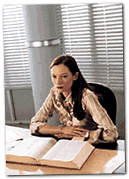LUST FOR LIFE
Holly Willis on Susan Streitfeld's Female Perversions
Writer/director Susan Streitfeld, an NYU film grad and co-founder of the theater company Hothouse, read the book and contacted Kaplan immediately about the rights. She then spent nearly three years adapting it. "Because the material is analytical and psychologically oriented, the question was how to get a plot that would carry an audience through the material but still deal with these compelling issues." Streitfeld ended up making her main character, Eve, a palimpsest for an array of perversions in the book; other characters embody other behaviors, the most poignant being 13-year-old Edwina (Dale Shuger), who carves into her body with a vengeance.
The resulting film merges narrative and fantasy sequences in a story covering several tense days as Eve waits to find out if she'll advance from top-notch prosecutor to judge. Plagued with insecurity and facing a weekend without her boyfriend, Eve goes after Renee (Karen Sillas) and then has to deal with her sister (Amy Madigan), who has been put in jail for shoplifting. Worried about her body, age, appearance, sexual attractiveness, as well as her skills as a lawyer, Eve implodes.
Streitfeld gives us a sense of Eve's anxiety through several intense fantasy images. Shot against a rich black backdrop, the images capture the sense of bondage and inescapability: knotted cloth winds around a naked body; a woman traverses a tight rope; the woman encounters the image of the excessive female, a mud-covered body violating every standard of American female beauty. These sequences are cut into the story at various points, "perverting" the narrative by twisting it off track, if only momentarily. There are also amusing fragments of theory dotting the landscape of Eve's troubled world; again, Streitfeld's goal is to pervert or distort things just enough.
Although Streitfeld spent a long time writing and developing her first feature, she feels that the film "happened" during the editing. "In the editing I think you get closer to the unconscious," she says. "With the writing and words on the page you have more conscious control. But when you come into the editing process, you face the image. The subtlety of film is image."
Streitfeld also attributes the power of the film to casting. "Casting is like destiny," she says. "You have to stay connected to the soul of the character and the actor will hopefully find that soul. Casting is 90% of directing."
 |
| Tilda Swinton photo: Gillian Lefkowitz |
Strangely enough, Streitfeld and producer Mindy Affrime had little troubling putting together financing for the film. "The title and the perception that there was sexuality in the film were very attractive to investors," says Streitfeld. Once they had Swinton and Madigan attached, Affrime took the film to Europe and easily sold several territories. Then she took the film to Trans Atlantic (now Lakeshore), who put up $1.5 million; October also put up some money and came on as the domestic distributor. Both companies pre-sold the film, and because they had made a significant amount of money before the film actually began production, everyone was very hands-off during shooting, a situation that Streitfeld hopes to repeat on future productions. "I will always give up money to have control," she claims, noting as well that the process of filmmaking rather than the end product is more important to her. "This is an awful business full of big, rude people who are not in any way connected to the creative process. So your journey through the making of the film has to be what it's about. The end project certainly won't be yours."
Female Perversions opens domestically in mid-April.
VOD CALENDAR


 See the VOD Calendar →
See the VOD Calendar →


